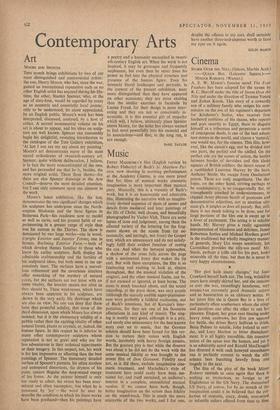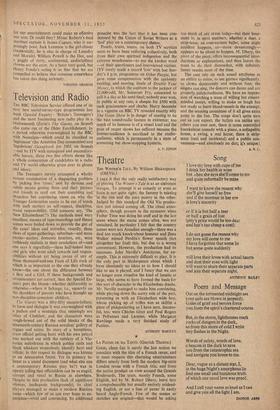Cinema
STORM OVER THE NILE. (Odeon, Marble Arch) -QUEEN BEE. (Leicester Square.)— MISTER ROBERTS. (Warner.) A. E. W. MASON'S famous novel The Four Feathers has been adapted for the screen by R. C. Sherriff under the title of Storm Over time Nile and under the direction of Terence Young and Zoltan Korda. This story of a cowardly son of a military family who resigns his com- mission on the eve of his regiment's departure for Kitchener's Sudan, who receives four feathered emblems of his shame, who repents and goes secretly to Egypt, there to disguise himself as a tribesman and perpetrate a series of courageous deeds, is one of the best adven- ture stories in the world, and almost a 'natural,' one would say, for the cinema. This film, how- ever, like the curate's egg, can be divided into two parts, the perfect and the addled. On the perfect side arc the scenes of action, the battles between hordes of dervishes and thin khaki squares of British soldiers, the desert rescue of a sunblinded Laurence Harvey by the hero, Anthony Steele, the escape from Omdurman prison. These are truly magnificent. The dia- logue, on the other hand, striving perhaps to be contemporary, is so exaggeratedly flat, so triumphantly couched in understatements, in clipped Army phrases bereft of pronouns and demonstrative adjectives, not to mention ulti- mate 'g's, it jangles as does all parody. But, still, there is not much talking to be done, and for large portions of the film one is swept up in a fever of excitement. The acting is in reliable hands. Mr. Harvey gives a really agonising interpretation of blindness and delirium, James Robertson Justice and Michael Hordern growl in the traditional but wholly imaginary manner of generals, Mary Ure weeps sensitively, Ian Carmichael provides the silly-ass motif. Mr. Steele, perhaps a trifle old for his part, looks miserable all the time, but then he is never in very happy circumstances.
'Her plot bath many changes,' but Joan Crawford herself hath not. The long, wrinkling years have simply skirted her, and she remains as ever she was, exceedingly handsome, very intense,• an extremely good dramatic actress and as humourless as an obituary notice. In her latest film she is Queen Bee in a hive O. particularly effete southerners whom she stings and paralyses one after the other to suit her pleasure. Elegant, her great eyes blazing under heavy mink eyebrows, her firm jaw squared for battle, she drives Barry Sullivan to drink, Betsy Palmer to suicide, John Ireland to mur- der, and Lucy Marlow to bitter disenchant- ment. It is all highly incredible, this transmu- tation of the apian into the human, and yet it is so admirably acted and Ranald MacDougall has directed it with such honeyed smoothness one is perfectly content to watch the silly solemn bees bumbling heavily from one tragedy to the next.
The film of the play of the book Mister Roberts reminds us once again that there is nothing so mysterious, so foreign to an Englishman as the US Navy. The dramatised US Navy, of course, for by no stretch of the imagination could it be believed that the col- lection of neurotic, crazy, drunk, over-sexed or infantile sailors offered from time to time
for our entertainment could make an effective war arm. Or could they? Mister Roberts's mad martinet captain is James Cagney, who is sur- prisingly poor. Jack Lemmon is the girl-chaser (incidentally, he is also in charge of Laundry and Morale), William Powell is the Doc, and a gaggle of rorty,, sentimental, undisciplined downs are the crew. As a farce very good, but Henry Fonda's acting is so fine that we are Compelled to believe that someone somewhere has taken this thing seriously.
VIRGINIA GRAHAM



































 Previous page
Previous page